Congratulations on deciding that you want to bring home a new kitten!
Just like you did research on how to choose the right breed, you will now need to find the best breeder.
Of course, it is really important to buy healthiest and happiest kitten from a legitimate breeder. But how do you know recognize the difference between a breeder you can trust and one you should avoid at all costs?
To help you, we’ve made a comprehensive list of questions to ask a cat breeder upon your visit.
If you’re curious about any particular questions and why they’re important, you can also click on the Table of Contents to navigate sections of this article and skip directly to any of them.
Let’s start!
Talking With The Breeder
Talking with the breeder, you should be able to differentiate people who
Respectable and caring will greatly appreciate communicating with you and will be open to all your questions. Not only that, but they will welcome your questions because they also want to know who you are as a buyer.
If your breeder is not interested in answering your questions, not concerned, or taking the direction of conversation somewhere else, this is your red flag.
Great, reputable breeders will not only be open to communicating with you through email or over the phone, but they will invite you to come to visit them and talk with them in-person.
A reputable breeder should not only have an email as a way to contact them, but a website, social media pages and so on.

Visiting The Breeder
Getting a cat is not only a big decision, but a lifetime responsibility, so you certainly do not want to make a buying decision chatting through email or over the phone.
Ask the breeder if and when it would be possible to check out the place where the kittens live with their parents and the rest of their litter.
Your red flag should immediately appear if the breeder refuses to let you come and visit. Some breeders will say that the kittens are at their friends, that they’re too young or their mother is too protective. If this is the case and you’re buying from a stranger, walk away.
There is absolutely no legitimate reason why you cannot check out the facility before buying a cat.
Visiting the breeder will give you a great deal of knowledge and understanding on how the breeder treats their kittens, in what environment they are raised in and if what they say is really true.
When you visit the property for the first time, pay attention to:
- Who the kittens live with – are they separated from their litter or live with their parents?
- Environment – is it clean, warm and safe?
- Food and water – do the kittens have access to both?
Look around and see if the property is well-kept and if the house is in good standing. Obviously, you are not a realtor and are not requiring perfection, but the place of living should not be filthy and messy all around.
As you make the visit, don’t just go by yourself but bring a friend with you. Having someone next to you will help you gain a different outlook on the place and ask about the things you didn’t think before or have missed.
Now, as you visit the breeder you will need to ask a set of questions we will go through below. You will want to know all the information you can get about the, health condition, rules and contract and so on.
Now, let’s head onto the questions you will ask a breeder before purchasing your kitten.
What Experience Do You Have?
One of the first questions you will want to ask the breeder is what experience they have. Remember, breeding is a process that takes great time and effort and there are many different things involved in what it takes to be a breeder.
Many breeders decide to become a breeder because they love their kittens, it is their family business for generations, or they belong to a specific group or organization that rescues kittens and takes good care of them.
However, there are always exceptions, and those are when they are looking for an “easy way to get extra money” or are doing something illegal.
Going further than that, the way to understand the difference is to look on an individual level. Genuine breeders will always have a personal connection and a story to why it is they’re doing what they’re doing.
Responsible and reputable breeders will have a name that you can cross-reference with breed club membership, participation records, and OFA/health testing records. Ask for those.
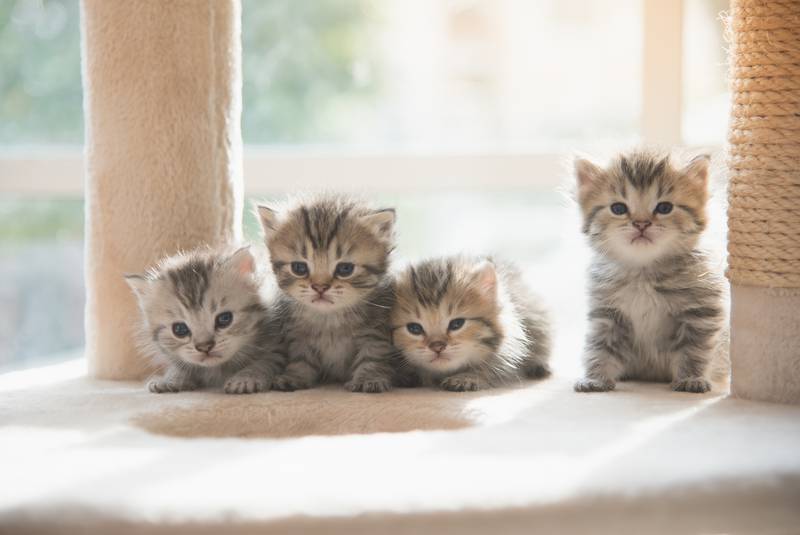
What Do You Know About This Particular Breed?
Breeders should not only be knowledgeable about the breeds you’re purchasing from them, they should be experts and be well aware of their day to day habits, characteristics as well as potential health related issues or genetic illnesses.
Breeders should have good reasons for deciding to breed exactly these kittens, or be a part of a specific group or organization. Some breeders decide to only breed rare types in order to sell them for a higher price. Your mission as a prospective buyer will be to understand the motives that the breeder has and if they’re just in it for the money.
You will definitely want to know what experience the breeder has and especially with the specific breed. For example, some of the questions you can ask are how long does it take to breed this sort and why did you decide to breed on it.
You will want to have a breeder that has some experience and knows what they are doing. You will need to evaluate their experience, knowledge and dedication. Asking about their experience will open doors to many other inquires below.
What Breeds Do You Have?
As mentioned above, you will definitely want to know more about the breeders personal connection with cats.
Ask questions such as:
- Why do you like cats?
- What types of cats do you have?
- Who is taking care of them?
- What are their names?
Based on these questions you should see if they have genuine excitement, interest, and love for what they’re doing on a personal level, or if they are a business type person looking to sell as many kittens as possible.
What Do You Do With Unsold Kittens?
Many kitten mills will often simply dispose of their extras because they are a cost to feed and vaccinate.
Ethical breeders will keep or adopt any of the kittens that have not been bought.
These poor animals are lucky if they make their way to the shelter, where they might have a chance. Unfortunately, many are abandoned, thrown into the garbage and so on.

How Many Litters Per Year Do You Breed?
A professional breeder should have between 4-10 litters per year. If a breeder has more than 12-15 litter per year at the very maximum, it might be impossible to manage.
Similarly, a breeder that has less than 2 litters per year might not have all the experience they need.
A breeder that has more than 3 litters at once might not have the time to care for all of them, unless with a big commercial facility and lots of hired help. Having a large facility does not always help, as it can reduce the amount of quality care every kitten needs on a personal level, and make it more business-like, especially if those involved are unfamiliar.
At What Age Do You Start Letting Your Kittens Go?
From eight to twelve weeks is the perfect for breeders to let go of their kittens.
Anything younger than that and the kittens will be too young to move, and their well being could be seriously put in danger. Things like getting registered, health checks and vaccinations are all important to be done in the first couple of weeks of age for a kitten.
Anything older than that and the kittens might be get attached to the place they live in and their temporary caretakers, which will do more harm than good.
Always make sure that the breeder is following the proper rules and regulations about their business and is concerned about the well being of its kittens more than anything else. This is one of the crucial questions to ask a breeder.
How Old Are The Kittens?
Similarly to the previous question, you should not only be concerned about the the breeder follow, but ask about the kittens you are interested in.
You want to make sure that the kittens you are going to adopt are not younger than 3 weeks when you’re visiting them for this first time, and that they are older than 8 weeks/2 months when they will be moving out with you.
If the kittens are younger than 3 weeks, you shouldn’t accept a visit to the breeder.
If the kittens are older than 12 weeks, ask the breeder why they have not been sold yet.
Remember that the process of adopting a kitten takes time – from weeks to months. Plan beforehand when you’re adopting a kitten and take this time into the account.
Where Were Your Kittens Raised?
It is recommended to check twice and ask if the kittens were raised at the facility you are visiting or somewhere else. Perhaps they were rescued and brought to the facility when they were 1 week old, or something else.
Your red flag should be if the breeder says they were brought over from another facility. This may or many not indicate there were some problems on the way.
On your visit to the facility you will see the area the kittens live in. Understanding where they live, where they come from and how they were raised will also help you and your future kittens in the transitional period and getting used to living with you.
The place you want your kittens to grow up in the first couple of weeks of age needs to be safe, warm and clean, where they can eat food and drink water, have shelter, feel comfort, and all the loving support they need from their temporary caretakers.
Visiting will give you some insight on what your kittens are already used to and how to move forward from there.
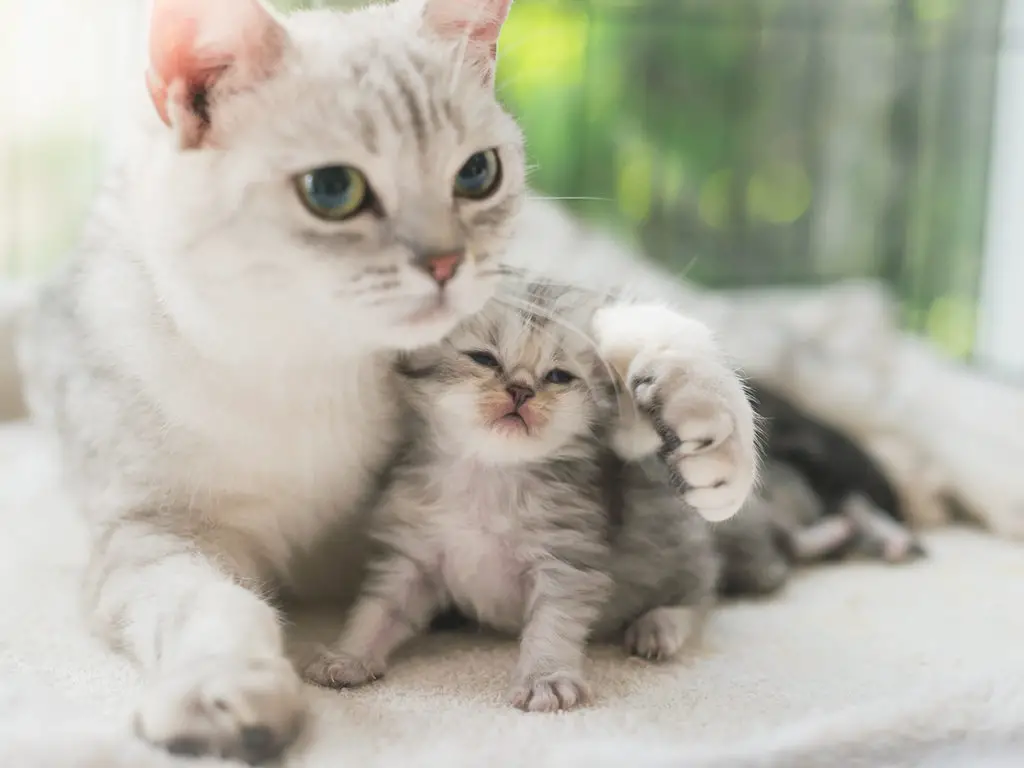
Where Are The Kittens Parents?
One of the most important questions to ask on your visit is about the parents. Ask where they are and if you can visit them, and if they have any photos of their parents from before.
If you’re able to see them, check their physical appearance:
- Size
- Weight
- Appearance
- Color
Look at the specific character of the parents. If you are looking for a calmer cat, and yet its parents are full of energy and are jumping around, you might want to look for another breeder.
Keep your mind open to any underlying issues. Ask in what activities do the parents engage, and if there are any problems.
By physically checking the location where the mother and her kittens are you will gain a great insight on if this is the breeder to buy from.
Lastly, you should ask the breeder why they’ve chosen to breed those specific varieties together. Make sure that it was purposeful and confirm that the kittens know who their parents are by grouping them together.
Young kittens will act differently when they are close to their parents. When close to her kittens, does the mother seem fearful or aggressive? Is she overprotective? Is she calm?
The character of their mother close to her kittens will also give you a great indication on how ready the kittens are for moving away.
Can I See The Health Certificate Of The Parents?
On the most basic requirements you should have for your breeder is to have completed all of the breed’s health tests.
Even though this is a crucial part of the breeding process, because it is so expensive it is often avoided by irresponsible breeders.
Having a health certificate of your kitten’s parents you will be able to determine if there are any breed-specific diseases or genetic diseases that are common for the breed.
It is known that there is a higher probability for purebred cats to genetically pass on their diseases to their offspring.
As there are certain breeds that are more prone to specific issues than others, having a health certificate will help you look through the family history and see whether or not the bloodline has those issues.
Can I See The Rest Of The Litter?
A cat will usually have an average of 4 kittens in every litter. Be sure to compare the kitten with the rest of the litter.
See if they all seem to be equally healthy in size and character. Larger breeds will have bigger litters. Check the average female and male ratio in every litter.
Depending on how the kittens interact with each other, it will give you a glimpse of their personality. One might be very energetic and play with everyone, another might be calm and enjoy being petted, and another one might be very curious about who you are and greet you as soon as you come.
Comparing the kittens with the rest of their litter, you will know if the personality of your kitten is unique to who they are or particular to their breed.
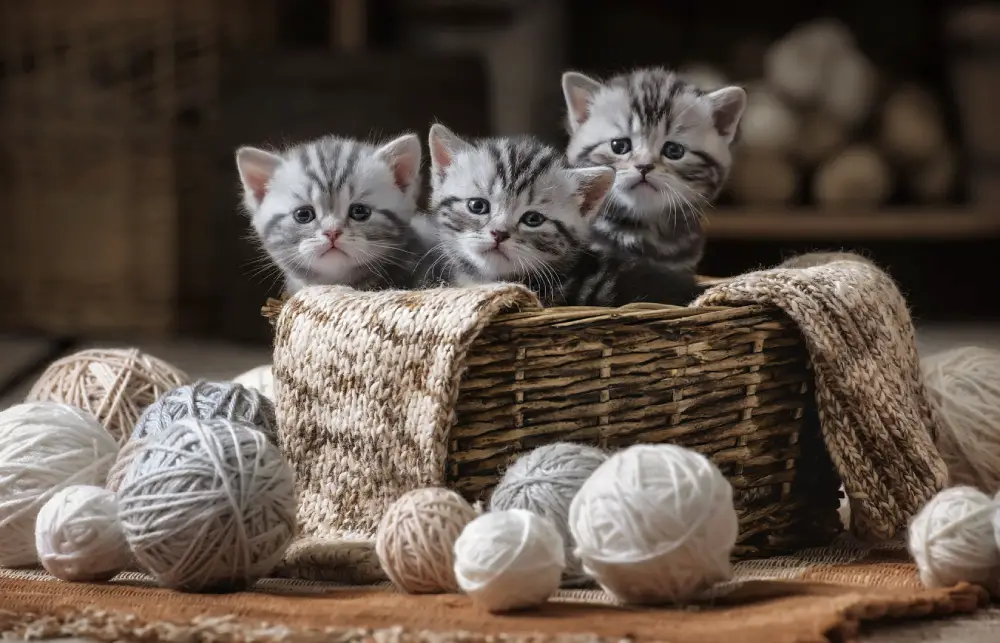
Are The Kittens Registered?
Your kitten and its parents should be registered by a club/registry association, such as the CFA (The Cat Fanciers’ Association). However, bigger clubs does not necessarily mean they’re better, and it is many times better a cat to be registered in a state level club/association.
Being a part of a club is always a great idea because they strictly monitor their breeds and are very knowledgeable about the specific breeds involved.
When looking through the documents, be sure to check if both of the parents are registered. If one of the parents is not registered, then the cat will never be able to be registered in a club.
Having the papers is important when you’re are planning on breeding the cat or need a confirmation of the breed. It is also to make sure everything is regulated and the cats have been vetted.
A lot of people make the mistake of paying more for extra papers. Almost always this is just a way for clubs to generate more money. The document you should care the most is the written confirmation of the breeding rights.
Are The Kittens Healthy?
Ask the breeder for a medical history of the kittens and if there have been any concerning issues about the health of a cat.
If there have been illnesses, what treatments did the kittens receive? And more than that, ask if the breeder is willing to give you a refund if there are serious health problems in the first couple of weeks or months.
Some of the signs of a healthy kitten are:
- Clear and bright eyes – kittens eyes should be clear and bright, and be able to focus easily on your fingers
- Nose – a discharge around kittens nose may indicate sickness, such as an upper respiratory tract infection
- Clean ears – unhealthy kittens may have ear mites and scratching their ears often
- Pink gums – pale gums are associated with lack of blood flow as a result of shock, or anemia
- Smooth body – the kitten’s body should be smooth, without noticeable lumps that could indicate abscesses or other health issues
- Clear fur – the kitten should be free from parasites such as fleas or ringworms
- Coordinated movement – healthy kitten will move in a coordinated fashion
- Energy levels – most kittens spend a lot more time sleeping than older cats, and playing when they’re awake
The average birth weight for most cats is about 100 grams. Healthy kittens should double their birth weight in the first 2 weeks and continue to grow steadily.
What Type Of Health Testing Do You Do?
Ask specifically what types of health testing did the breeder do.
The tests should include:
- Feline leukemia (FeLV)
- Feline Immunodeficiency Virus (FIV)
- Ova and Parasites (O&P)
- Hip Dysplasia (HD)
- Patellar Luxation (PL)
- Hypertrophic Cardiomyopathy (HCM)
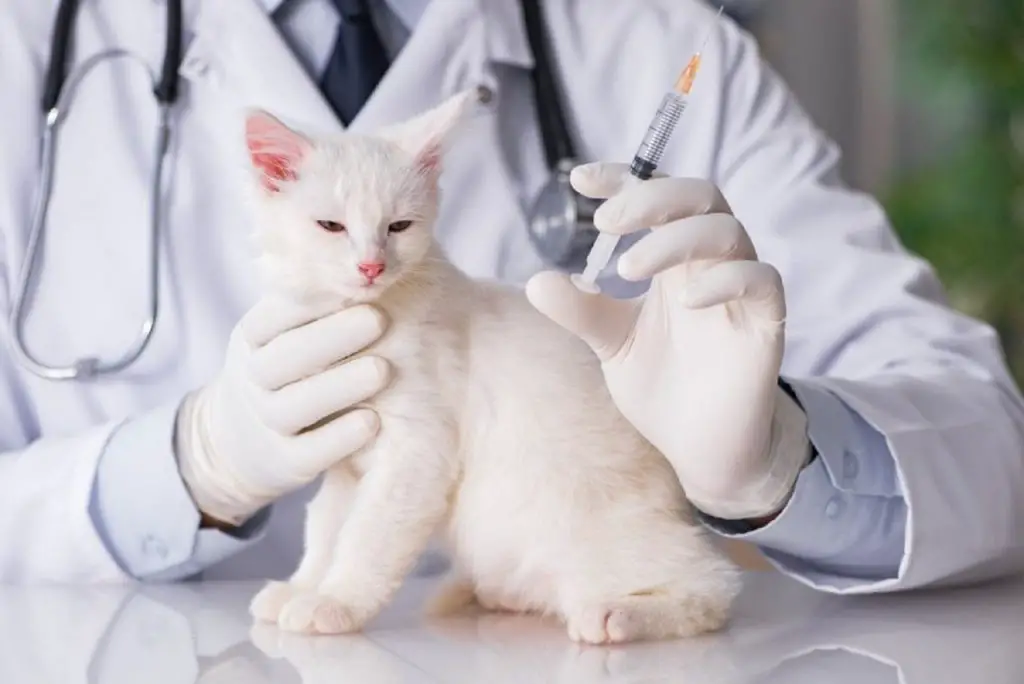
Are The Kittens Vaccinated?
Vaccinated kittens are protected from many of the most deadly diseases and you will want to make sure that your kittens have been vaccinated.
Kittens usually receive their 1st round of shots when they are between 1 to 2 months old, and second when they are 2 to 3 months old.
Kittens should not mix with other cats until vaccinated, as this increases the risk for diseases.
Ask how many shots did the kittens already have and inquire about the vaccination schedule you will need to follow after you bring them home.
All kittens must be vaccinated against infectious diseases in order to survive and grow healthy and strong.
Are The Kittens Dewormed?
During birth, kittens get infected with worms by their mother, so it is important to deworm them.
Deworming is a process of removing these parasites, most often by giving a liquid drench orally.
All kittens should be treated for common parasites such as roundworms and hookworms in the 2nd, 4th, and 6th week of age. This process should continue until the 6 months of age and after every couple of months.
Adult cats are less affected by worms than kittens, but they will still need to be dewormed.
Are There Any Genetic Issues?
Kittens are very fragile in the first couple of weeks of age, and prone to various diseases. Depending on the breed, some may be at much higher risk of having inherited diseases present from their parents.
Similar to humans, there is no way to be absolutely sure that any breed, whether is pure or mixed, will have an inherited health problem. We cannot know because some diseases are rare, many don’t offer DNA testing or easy-to-predict inheritance. Genetic illnesses depend on many factors.
However, asking the right questions by checking the medical history and seeing these percentages will minimize the risk. If you know that the parents have suffered from certain genetic illness, it will be easier to prepare and know what to except and what is likely or less likely.

What Are You Feeding The Kittens?
For the first few weeks after getting your newly adopted kittens from the breeder, it will be especially important to continue feeding the kittens with what they have already been fed.
A sudden change in diet can lead to vomiting, diarrhea, weight loss and various health issues. If there are any health problems, it will be even more important to follow a specific diet.
The food you feed your kittens with should be of high quality, well-balanced, and contain high protein for a healthy cat growth.
Almost all breeders will provide you with a diet plan and help you out with any types of questions regarding nutrition.
Are The Kittens Socialized?
The primary socialization window for kittens starts between two to seven weeks of age, starting with self play, play with objects around them and social play.
Make sure that the kittens:
- Are exposed to different sounds, music, or traffic noises
- Interact with other humans (guests or strangers) and cats, as well as other animals
- Have experience in different environments (going outside, car ride, veterinary office)
Having enough social experience will immensely help in the transitional period of your kitten.
Remember, your kitten is not just getting used to who you as their owner but also the environment, place of living, new routines, and many other things.
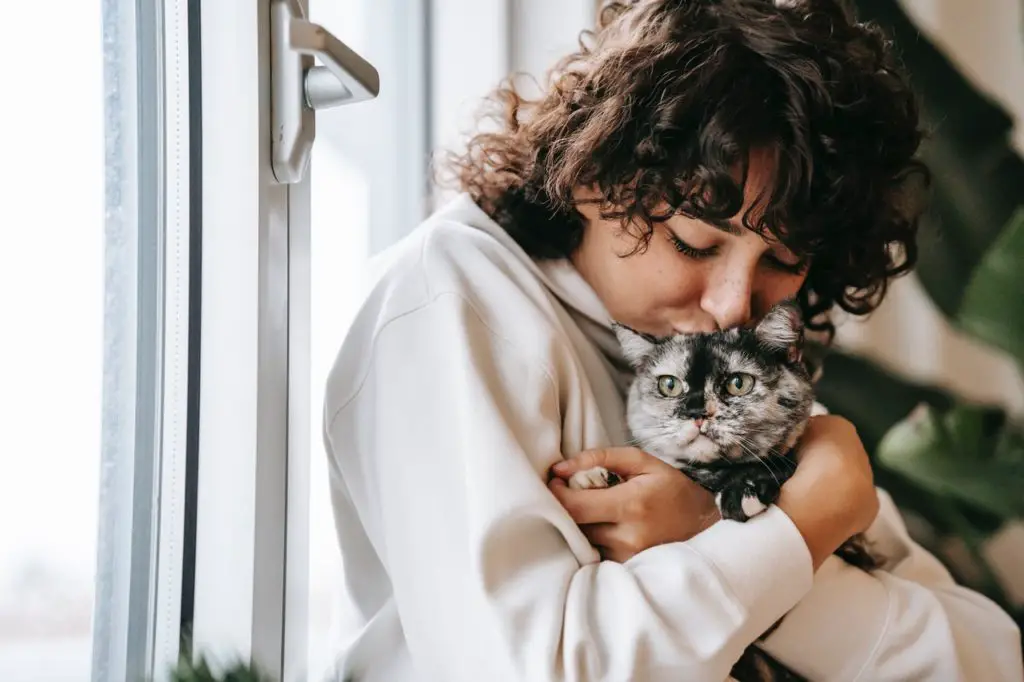
Do They Like Visitors?
Many cats are fearful of strangers or visitors because of their lack of experience with strangers when they were kittens. Because of that, make sure to ask to visit the kittens and interact with them. How do they respond? Do they find you interesting, or a curiosity?
If cats are not introduced to socialization early on, in the period of three to nine weeks of age, they might show fear of stranger when they grow up.
Even though cats are born with personalities of their own, the environment they grow up in can greatly affect how they become as adults.
Some kittens may get too bounded to their owners.
On the other hand, kittens with less human interaction as babies are more likely to become fearful or stressed out when socializing with new strangers. If the kittens are not getting enough attention, it certainly means the breeders are not taking good care of them.
Are There Any Behavioral Issues?
The most common cat behavioral problems are house soiling, aggression and scratching. A cat may be displaying aggression toward you petting him because he’s in physical pain, or for many other reasons.
Any behavioral issues may indicate that the breeder has not been properly taking care of the kitten.
Honest breeder should let you know if there are any issues, but you should be able to check on the kittens yourself by spending some time alone with them or observing them from a distance as you visit the breeder.
Sometimes kittens will display behavioral issues because they were not able to adapt to the environment they’re in early on.
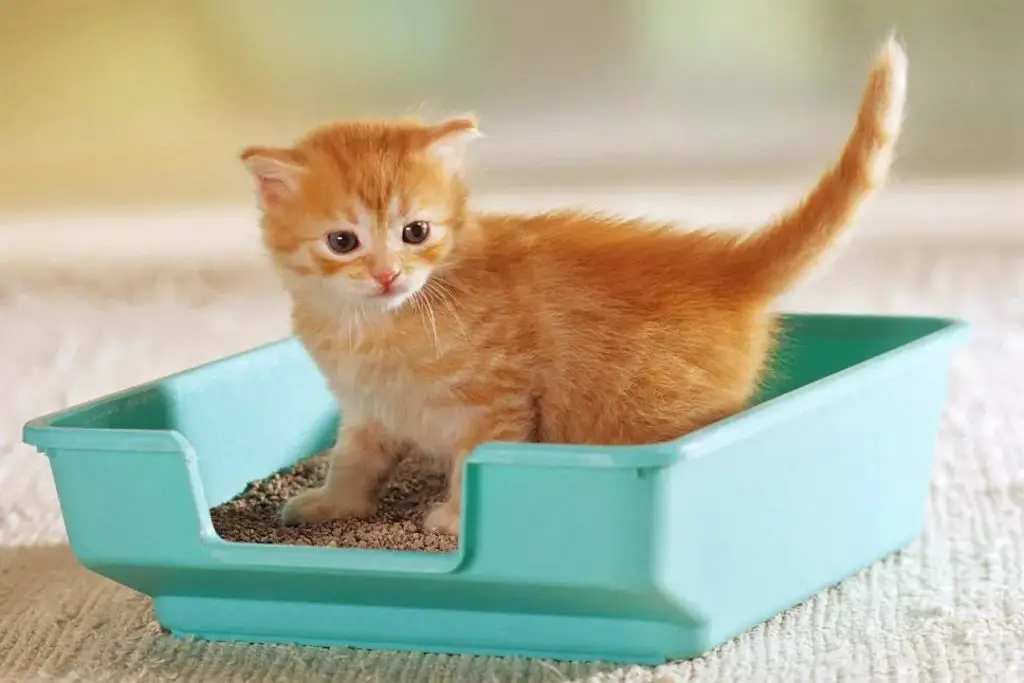
When Did You Start To Litter Train Kittens?
Newborn kittens need to be stimulated to go the bathroom and won’t start using the litter box until around the third week of age.
When cats are born, they do not know how to use a litter box and learn about the bathroom from their mom.
Getting a kitten to use the litter might be a big challenge for a breeder, and it is important to start training the kittens on how to use the litter box as soon as possible.
Ask the breeder if the kittens are used to using the litter or if they need more training. Also ask about the types of tools they used and if they had success in the process.
Pay attention to the methods the breeder used to train the kitten. If a cat has an accident, we would never yell or hit them.
As BCSPA points out, cat’s litter box will be a big part of her life, and it is important that she enjoys using it.
Is There Any Other Special Information I Need?
It is always a good idea to ask the breeder again if there’s any additional or special information you will need, especially after you’ve finished the main conversation.
The primary focus for the breeder will be to go through the main things and most important topics, but on the way, they may forget little details that are also important. They may range from state regulations or their work hours on holidays, or relevant breed related information.
Going through all these different questions is a thorough and complicated process. Ask the breeder if they have any additional information for you that they have forgotten to share.
Do You Have A Contract?
Most likely, breeders should offer an official contract of sale when purchasing your kitten. This contract will contain and outline certain requirements:
- How you should treat your kitten
- To not give your kitten up for adoption
- The laws specific to your country/state
- The fines you will need to pay if you break the contract
A contract should also state very clearly the price of the cat, breed information. Some contracts also contain a health guarantee, while some keep the health guarantee in a separate document.
On the very bottom of the contract, or in some cases the top page, there should be legal information relating to the breeder and ways to contact them. Check if this information is there, and if it’s accurate.
Do not accept the offer of buying your kitten without an official, and signed, contract of sale.
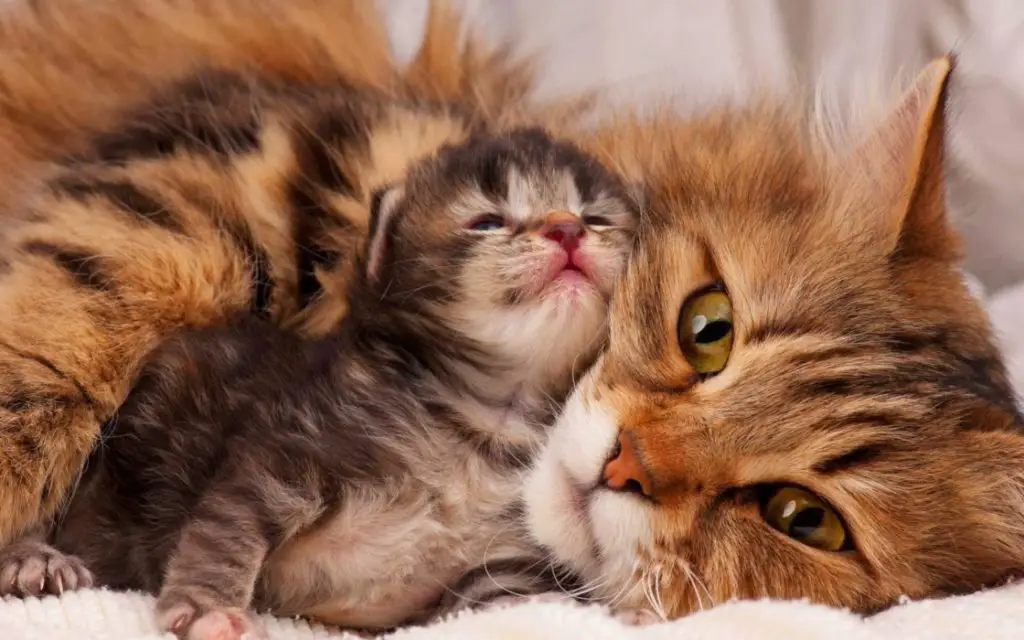
Do You Take Refundable Deposits?
A great majority of breeders require deposits ranging from $200 – $500 to reserve a kitten. Deposits are given by a buyer in good faith, reflecting their commitment to purchasing a kitten from that breeder.
However, some breeders may take an advantage of this and offer non-refundable deposits.
Some people make the mistake of giving the deposit away to reserve their new pets, only to find out later on the road that they are not refundable. Make sure to ask whether or not the deposits are refundable to protect yourself from this situation.
Never send someone a money order online to make the deposit, and do not give a deposit without a signed agreement.
What Requirements Do You Have?
Good breeders will have their requirements and will turn down prospects if they don’t fit.
Some breeders will not allow you to take the kittens for adoption unless you spay or neuter them early on. Before deciding on the purchase you will want to know all the requirements.
Some of the requirements a breeder might have could be:
- Financial situation – if you do not have enough money to cover your expenses, then it wouldn’t be a wise idea to get a new pet.
- Health – If you have certain health issues or limitations, this will be important to share with the breeder. Similarly, if you have allergies, it is always a good idea to share what type of allergies you have.
- Lifestyle – if you like travelling a lot, this won’t be the best type of environment for your kitten to grow up in. Similarly, if you are a very busy person and not often at home, your kitten won’t be receiving all the loving attention needed.
- Personality – are you a dedicated who’s truth to who they are, or do you run away from commitments and responsibilities? When finding potential buyers, breeders will look through your personality and see if you’d fit.
- Attitude – are you ready for the challenge and excited to take in a kitten into your life? Or are you doing this because of the excitement of other people that are close to you?
- Family – do you have children of your own? Do you know how to take care for others and what it means to be in a family?
Breeders are looking for responsible people that know they’re taking a fully conscious being into their lives as part of their new family and not just “for fun”.
Do You Have More Questions For Me?
While it will be your responsibility to ask plenty of questions, good breeders will also be interested in the potential owners and be very involved in the conversation and asking questions.
Asking the breeder if they have additional questions for you will help them in establishing trust between you and the them. Be prepared to answer them.
The questions that a breeder might ask you could range from, “What are you interested in having a cat?” or “How do you plan to take care of your cat?” and so on.
The answers to these questions will show the breeder that you really care for the well being of the kitten/s in the future and that they will be a safe place.
When you come to the meeting with the breeder, come prepared, and let them know you have the best intentions in mind.
Do You Offer Any Additional Support After?
A professional breeder will be just as interested in you as you are in him. For breeders, it is important that the kittens you are buying will also be taken care by responsible people into a good life.
Often, breeders will include a cat starter kit with everything you need to know about how to take care of your cat. When thinking about how to care for your cat, include your other family members into consideration and if they’re ready for a cat. If you have kids, be sure to teach them how to be gentle with a kitten.
These starter kits should not just contain additional information about your cat and cat breed, but in-depth information on diet, routines things to watch out for and so on.
Make sure to ask for such a starter kit and any other information, support, or services they provide free of charge.
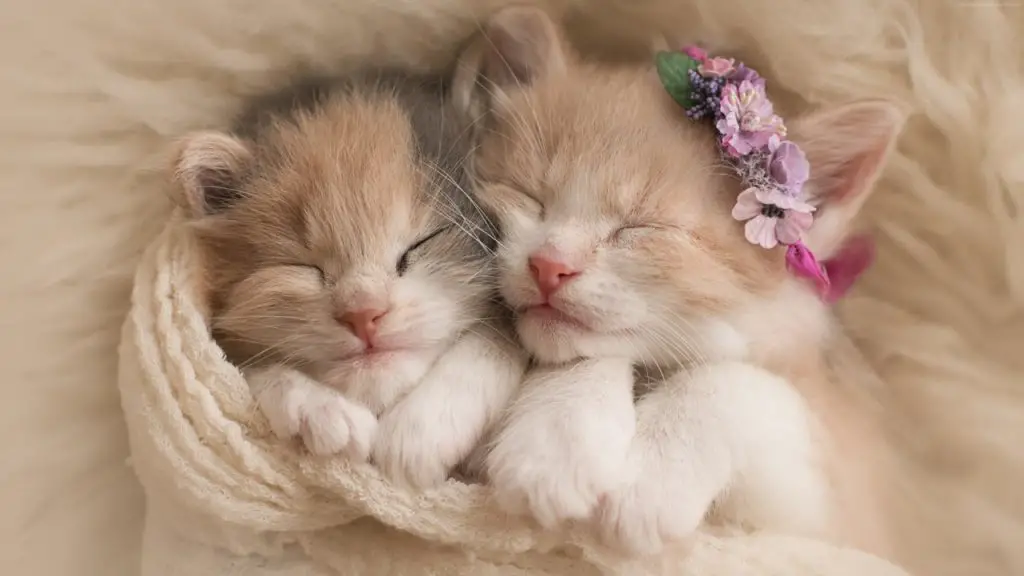
How Can We Contact You After Picking Up The Kittens?
There is not such a thing as too many questions when it comes to the well being of your cat.
A professional breeder will always have a way for you to contact them and ask further questions if needed. Remember, the process of a kitten getting used to a new owner and a place of living takes time.
As an owner, for you it is important to be dedicated, patient, and make sure this transition is as easy at is can be for the well being of your kitten.
In the process of getting a kitten you will definitely need to be in contact with people that can help you in any and all situations. This doesn’t just mean reading about what to do, but having someone come into your home physically and visit your cat from time to time to make sure everything is alright.
Back to back communication with the breeder is highly important in case you run into any problems. You will always be able to know where to find support or request for more information specific to that breed.
Cat breeders should not only provide assistance in this process, but also help you find the experts you can be in communication more easily (eg. people that live in the same area).
What Is Your Return Policy?
Responsible breeders care about the fates of the animals they breed. They will not only help you with problems, but will almost always take back any animal of their breeding, even if it’s years later.
If your breeder refuses or does not care about the return policy, this is a big red flag that you should pay attention to.

Can You Provide References?
Reputable breeders should be able to easily provide you contact information with any previous cat owners that they have been sold to.
You will learn a lot by calling the other cat owners for reference and asking them about their experience and process of obtaining the kittens.
This will also allow you the opportunity to ask if there were any other things they were not prepared for or expecting after receiving their kittens.
If the kittens are from the same parents, ask every question you can think of to find out if this is the breed you are looking for.
Through the conversation with another owner you’ll be able to confirm or deny a lot of the things you have learned from the breeder, and whether or not its actually the truth.
Having this information will greatly help you in making your final decision.
References
- https://www.aspca.org
- http://www.vetstreet.com
- https://pets.webmd.com/cats/
- https://icatcare.org/
- https://tica.org/
Do you like our article? Let us know and comment below!
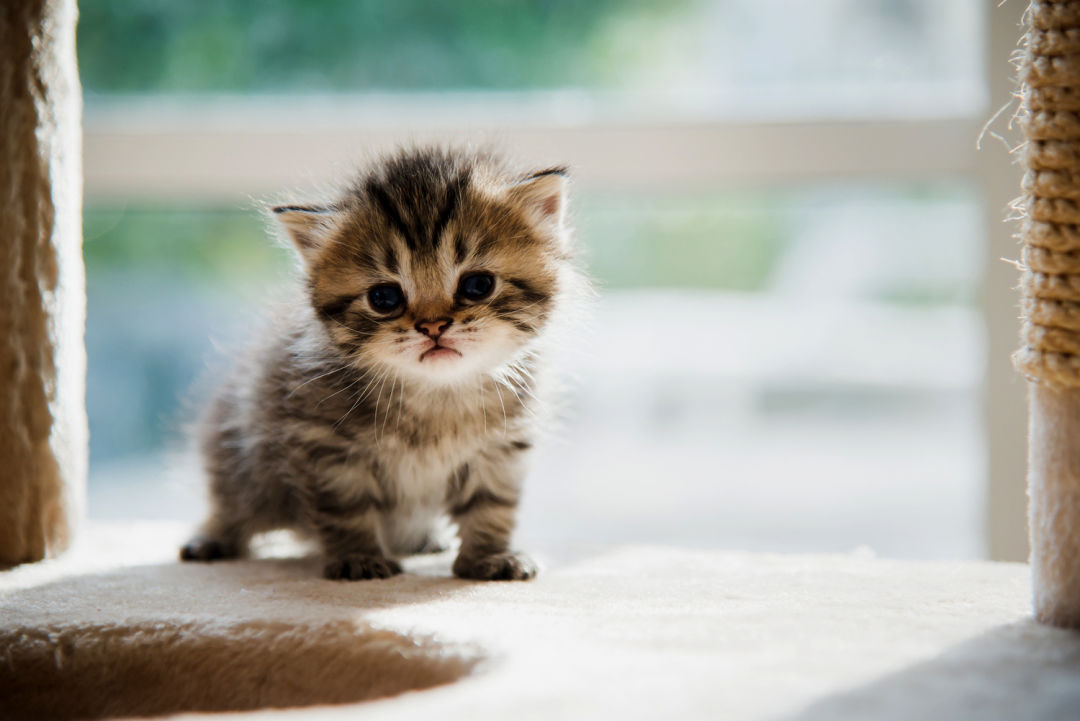


Leave a Comment